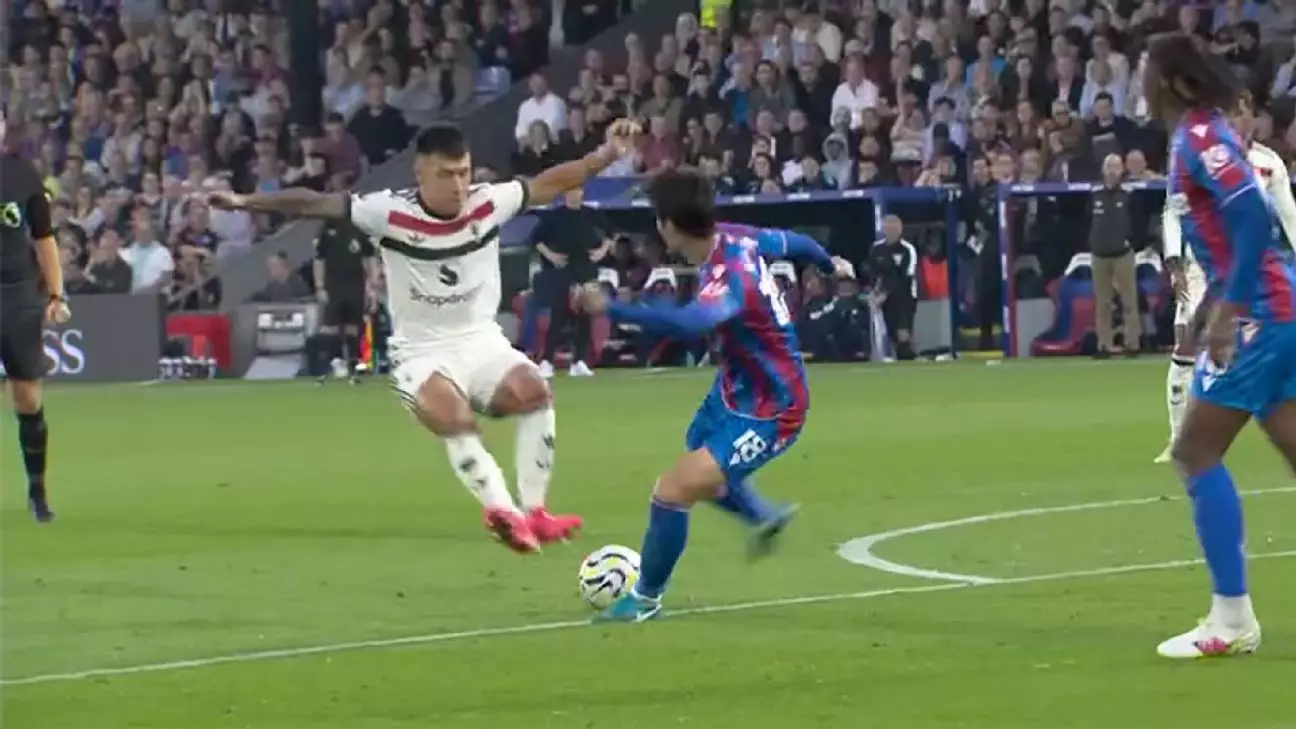The Premier League stands as one of the most watched football leagues worldwide, not only for its competitive nature but also for the controversies that frequently arise from key match incidents (KMIs). These situations, particularly those involving contentious referee decisions and the use of Video Assistant Referees (VAR), have ignited vibrant debates among fans, pundits, and players alike. The recent decisions taken by the Independent KMI Panel regarding various incidents during the matches highlight the ongoing complexity and contentious nature surrounding officiating in modern football.
One of the most talked-about moments from a recent match involved Manchester United defender Lisandro Martínez, who found himself under scrutiny after a robust challenge on Crystal Palace’s Daichi Kamada in a match that ended in a goalless draw. Referee David Coote issued a yellow card for the tackle, which ignited a flurry of opinions on social media and in football circles. The VAR, Chris Kavanagh, refrained from recommending that Coote review the tackle via the pitchside monitor, leading to the KMI panel’s examination of the incident.
While UEFA guidelines, which emphasize that non-contact challenges should ideally result in a yellow card, were cited in their decision, the panel did not shy away from expressing their disdain for such challenges. Their comment that “Martínez is so fortunate not to have contacted Kamada” underscores a widespread sentiment among many that regardless of the letter of the law, some challenges have no place on the pitch. This incident reflects the broader discourse surrounding the balance between strict rule adherence and the subjective interpretation of on-field behavior by referees.
The KMI panel’s decision-making process became slightly more complicated with the case of Arsenal’s Leandro Trossard, who received a second yellow card for delaying the game. This was upheld by the panel, indicating that not all decisions made by officials are uniformly recognized as contentious, even when marked by differing degrees of intensity. Interestingly, the panel’s refusal to back the second yellow card given to Nottingham Forest’s Morgan Gibbs-White illustrates the inherent subjectivity in officiating where different eyes analyze a situation and arrive at contrasting conclusions.
While the panel ultimately ruled against Gibbs-White’s sending off, their split opinion (3-2) reflects the challenges faced by officials in making real-time decisions during high-paced matches. The debate on whether challenges reflect reckless disregard for opponent safety continues to provoke thought, leaving fans questioning the criteria by which referees and VAR assess each incident.
A pivotal moment during the same matchday hinged on a potential penalty awarded for a foul by Chelsea’s Wesley Fofana on Crysencio Summerville. Here, the panel’s vote of 3-2 in favor of a penalty potentially reveals the underlying complexities referees face concerning off-the-ball contact and player progress towards the ball. Although the panel acknowledged that it may have constituted a foul, they remained steadfast that it did not qualify for VAR intervention—a decision that indicates a nuanced understanding of what constitutes ‘clear and obvious’ errors.
This episode epitomizes how varying interpretations of rules can generate discontent among fans, particularly when subjective judgments define the outcomes of critical’situations in matches. It raises pertinent questions about the efficacy of VAR in rectifying incorrect on-field decisions, as evidenced by the KMI panel ruling several errors while determining others did not cross the threshold for intervention.
The VAR Landscape: Continual Evolution
As the narration of match-day rulings progresses, it is essential to acknowledge the developments in VAR operations since its introduction. Only one erroneous VAR intervention has been noted thus far this season, a statistic significantly better than the same period last season where seven errors had been recorded. This improvement suggests an evolving understanding and application of VAR protocols; however, the mere fact that contentious situations arise demonstrates that even with technological assistance, clarity in officiating remains an ongoing challenge.
The Premier League’s management of key match incidents heralds the complexities inherent in modern football. With a reliance on both human judgment and technology, consistency in officiating becomes an elusive goal. As the football community continues to grapple with these challenges, the conversation surrounding the application and evolution of the rules remains essential in enhancing both player safety and the overall integrity of the game.

